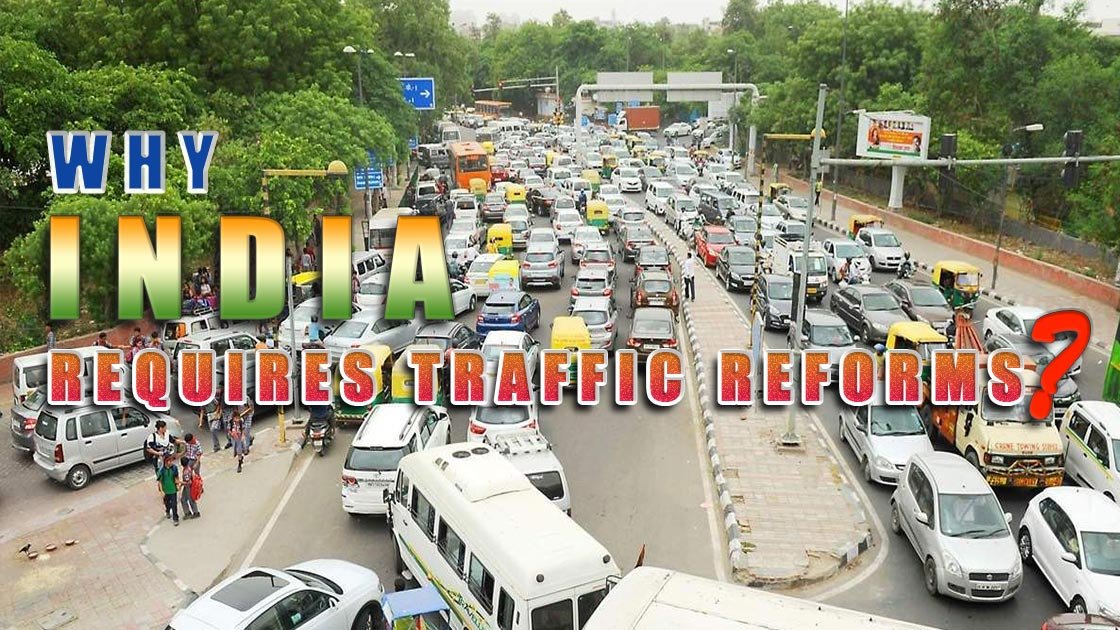India, often regarded as ‘one of the fastest growing countries’, aspires to grow into a $5 trillion economy. But its dreams and aspirations have come to a standstill as India is having some of its most dreadful days recently. Besides natural calamities, paucity of ground water, poor performance in GDP growth; one of the paramount concerns is road safety and fatalities. Report says almost 1, 50,000 people died in the road accidents in the country in 2017, which is 10% of all fatalities worldwide –most by a single country! World Bank report says, road accidents in India cost about 3% of the country’s GDP. Road-safety and traffic control is an important aspect for any nation and sans a proper Motor Vehicle Rules and regulations, without which no country can ever aim to reach to the epitome of excellence.
There were umpteen loopholes in our Motor Vehicle Act (MV Act 1988) and numero uno being the dishonesty of law enforcement officials and rule-breaking nature of common people. Many times citizens experienced that most of the offenders with heavy pockets goes scot free due to the corrupted bureaucratic system. The new government brought in some new amendments in this MV Act (2019), which are very much desirable. But unless law enforcement personnel give up old habits like subornment, the purpose of the new law will be crushed.
Before the 1st September 2019, we were stuck in the three decade age old MV Act 1988. In these three decade, scenario has been changed downright. Since 2000, although, the numbers of motor vehicles have increased by 158%, yet road length in India has increased only by 39%. In this current picture, MV Act 1988 is too inadequate. The penalties mentioned in this Act, are far below par. Besides that, another faux-pas of this Act is one person can hold multiple licenses. MV Act 1988 is also has problem in accountability as there are no provisions to mark the black spots in the roads and highways also. As per the survey result, designing faults of the Act caused 1289 accidents in 2016. A report named ‘Road Accidents in India – 2016’ portrayed us that the road accidents in the country have decreased 4.1% in 2016 as compared to 2015. However, fatalities resulting from these risen by about 3.2%. These reports have revealed the Achilles-heel of our Motor Vehicle Act (1988) to a tee. Truly speaking the road-accident problem has turned out to be the sword of Damocles for our nation. To call a spade a spade, till 2019, the satraps of our country have hood-winked the denizens and nothing concrete has taken place on road-safety and traffic reforms.
Recently India has made some International agreements and promised to improve its road safety and will make the traffic reforms. India is a signatory to the Brasilia Declaration on Road Safety by World Health Organization (WHO). India is committed to reduce the number of fatalities and serious injuries to 50% by 2020. India has an agreement on Sustainable development goals (SDGs), Goal 3. Target 3.6 (Reduce Road Crash Death). India has promised in this agreement, India will halve the number of global deaths and injuries from road traffic accidents by 2020. Now the Motor Vehicles (Amendment) Bill, 2019, introduces several amendments in the 30-year-old law and it was passed by the lower House, Lok Sabha as well as the upper House Rajya Sabha earlier in the last month. Although this Bill was introduced in Parliament by the road transport and highway ministry in 2016, after which it was passed by the Lok Sabha in 2017, but it failed to accumulate support in the Rajya Sabha.
The steep and stringent penalties (increased almost 10 times on certain offenses such as Drink and drive, over-speeding, not wearing seat-belts or helmets) prescribed under the Act have been criticized by many state governments, denizens and politicians. Although 18 state transport ministers positively reviewed this amendments before passing it in the both Houses, Gujarat, West Bengal, Odisha, Kerala, Karnataka, etc., some states are now not in a mood to implement the new amendments in their states.
In this regard union road, transport and highway minister asked a question that whether the value of penalties is more important or the lives of people. Penalties are just a deterrence, thus people has to think twice before breaking a rule or regulation. If motorists are ready to obey all the rules and regulations perfectly for road-safety, then they should not be anxious about the penalties. However it’s true that issues with infrastructure are a big apprehension for all and those are yet to be standardized across the country. States have the rights to bring down the fines as the Act is in the concurrent list of the Indian Constitution but harsh penalties are necessary because people’s lives must be saved.
Now it’s also a litmus test for the enforcement agencies to implement the Act perfectly. Central and state should work together and should appoint adequate traffic police personnel with adequate amount of technologies to control the traffic and ensure road safety. Rajasthan has partially implemented the Act and has decided to take steps to ‘self-motivate people’ to obey the traffic rules. All the other states should follow its suite. Even the forth-estate has to be sensible, should show the positive sides of the Acts and should refrain from Yellow-journalism.
